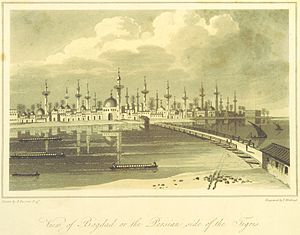Abu l'Hasan al-Ashari
| Imam al-Ashʿarī | |
|---|---|

A depiction of Baghdad from 1808, taken from the print collection in Travels in Asia and Africa, etc. (ed. J. P. Berjew, British Library); al-Ashʿarī spent his entire life in this city in the twelfth-century
|
|
| Theologian; Great Articulator of Orthodox Theology |
|
| Venerated in | Sunni Islam, but his theology has been controversial among those Sunnis who follow the Athari creed |
| Major shrine | Tomb of al-Ashʿarī, Baghdad, Iraq |
| Abu al-Hasan al-Ash'ari | |
|---|---|
| Title | Imam al-Mutakallimin, Imam Ahl al-Sunnah wa al-Jama'ah |
| Born | AH 260 (873/874) Basra |
| Died | AH 324 (935/936) Baghdad |
| Ethnicity | Arab |
| Era | Islamic golden age |
| Religion | Islam |
| Jurisprudence | Sunni |
| Creed | Sunni Shafi'i |
| Main interest(s) | Islamic theology |
| Notable work(s) | Maqalat al-Islamiyyin wa Ikhtilaf al-Musallin (The Treatises of the Islamic Schools), al-Luma' fi al-Rad 'ala Ahl al-Ziyagh wa al-Bida' (Refutation to Heresy), Al-Ibanah 'an Usul al-Diyanah, Risalah ila Ahl al-Thaghr |
|
Influenced by
|
|
|
Influenced
|
|
Abū l-Ḥasan al-Ashʿarī 260–324 AH (874–936 CE) (Arabic: أبو الحسن الأشعري) was a Shafi'i scholar and theologian who founded the school of tenets of faith that bears his name (Ash'ari).
Al-Ash'ari was born in Basra, Iraq, and was a descendant of the famous companion of Muhammad, Abu Musa al-Ashari. As a young man he studied under al-Jubba'i, a renowned teacher of Mu'tazilite theology and philosophy. He remained a Mutazalite until his fortieth year when al-Ash'ari saw Muhammad in a dream 3 times in Ramadan. Muhammad told him to support what was related from himself, that is, the traditions (hadiths). After this experience, he left the Mu'tazalites and became one of its most distinguished opponents, using the philosophical methods he had learned. Al-Ash'ari then spent the remaining years of his life engaged in developing his views and in composing polemics and arguments against his former Mutazalite colleagues. He is said to have written up to three hundred works, of which only four or five are known to be extant.
After leaving the Mu'tazili school, and joining the side of Traditionalist theologians al-Ash'ari formulated the theology of Sunni Islam. He was followed in this by a large number of distinguished scholars, most of whom belonged to the Shafi'i school of law. The most famous of these are Abul-Hassan Al-Bahili, Abu Bakr Al-Baqillani, al-Juwayni, Al-Razi and Al-Ghazali. Thus Al-Ash'ari’s school became, together with the Maturidi, the main schools reflecting the beliefs of the Sunnah.
...
Wikipedia
